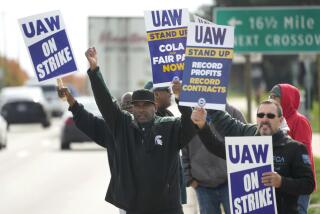Settlement in German Strike Appears Shaky
- Share via
BERLIN — An apparent settlement of eastern Germany’s metalworking strike looked unexpectedly shaky Sunday as local union leaders in the former Communist region balked at approving the deal.
An agreement reached Friday in the large eastern state of Saxony had been widely expected to provide a model for resolving the dispute elsewhere in the region.
The Saxony accord included pay raises totaling 26% this year and a phased plan to bring eastern wages up to western levels by mid-1997 at the latest.
The terms were hailed as a major victory by the country’s largest trade union, IG Metall.
Although IG Metall’s western German-dominated national executive board formally approved the Saxony settlement Saturday and recommended an end to the strike, union leaders in three of the four other eastern states have resisted.
Strike committees in the states of Brandenburg, Saxony-Anhalt and Mecklenburg-West Pomerania broke off extended weekend deliberations without taking any action and declared they would resume discussions today.
Union negotiators for eastern Germany’s small steel sector have also declared themselves unsatisfied with the Saxony compromise.
The refusal of local eastern union officials to quickly follow the national leadership’s recommendation to end the walkout reflects the distance, suspicion and mistrust that still exists between eastern and western Germans in all walks of life nearly three years after unification.
Late Sunday, it remained unclear whether the eastern union resistance was a brief protest that would fade quickly or whether it was part of a larger revolt against the national leadership that could jeopardize the settlement.
The dispute was triggered by the employers’ decision to suspend unilaterally a four-year contract reached in early 1991 that set out a plan to equalize wages and fringe benefits of eastern and western German workers within the contract period.
That contract required employers to give a 26% pay increase to eastern workers last April 1.
But the fragile state of eastern industry, a deepening recession and continued low productivity levels in the region led employers to fear that such a swift wage equalization would drive many struggling companies into bankruptcy.
They canceled the contract, offered a 9% pay increase and refused to commit themselves to any equalization timetable.
The strike, which began May 3, has affected large sections of eastern Germany’s metalworking industry, which employs about 400,000, and the steel industry, which has about 20,000 workers.
More to Read
Sign up for Essential California
The most important California stories and recommendations in your inbox every morning.
You may occasionally receive promotional content from the Los Angeles Times.













